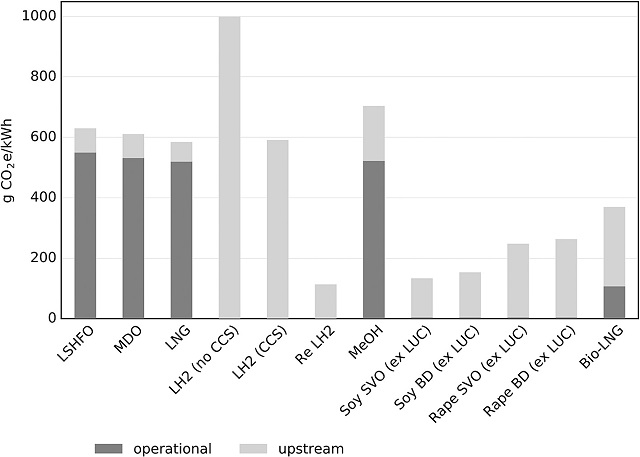Report: LNG Comparable to Other Fossil Fuels
There is no widely available fuel, including LNG, to manage climate change and local pollutants in tandem, according to a recent study by researchers at The University of Manchester.
The researchers carried out a life cycle assessment of current and future fuels used by the shipping companies to quantify their environmental impacts. The alternative fuels assessed in the study were LNG, methanol, liquid hydrogen, biodiesel, straight vegetable oil and bio-LNG. They measured the impacts of local pollutants (sulfur oxides, nitrogen oxides and particulate matter) and greenhouse gases (carbon dioxide, methane and nitrous oxide).
Fuels can incur the release of emissions at various stages of their life-cycle, for example during refining or transportation, or during the cultivation of the fuel if it is bio-derived. The latter may have impacts associated with cultivation, land-use change and agricultural inputs such as fertilizers. Although the upstream emissions are not attributed to the shipping sector, it is essential to ensure wider implications of fuel switches are accounted for, say the researchers. Failure to take upstream emissions into account in any sectoral assessment risks locking in carbon intensive solutions.
Dr Paul Gilbert, Senior Lecturer in Climate Change Mitigation, said: “In particular, LNG is a promising option for meeting existing regulation, but it is not a low greenhouse gas emissions fuel.
“To understand the full extent of the environmental implications it is important to consider the emissions released over the full life-cycle and not just during fuel combustion. Otherwise, there is a risk of misleading the industry and policy on the true emission penalties of any alternative fuels.”
The two conventional fossil fuels and LNG produce comparable baseline greenhouse gas emissions. When taking into account non-CO2 emissions, any reductions of greenhouse gas emissions in terms of CO2e are negligible for LNG, states the study. The main life-cycle hot-spots include liquefaction efficiency; extent of venting and flaring; and methane slip - the unintended release of methane during ship operation.
Even under idealized conditions, reductions of CO2 emissions are strictly limited. Bio-LNG produced from agricultural waste is an exception. The results show that it has the potential to cut CO2 emissions significantly. However, feedstock is limited.
The figure below shows lifecycle emissions in terms of carbon dioxide equivalents, distinguishing between upstream and operational emissions.


that matters most
Get the latest maritime news delivered to your inbox daily.
Source: Journal of Cleaner Production
The study says effort needs to be directed at overcoming barriers to exploiting the identified low carbon potential of fuels or finding alternatives. Gilbert said it is important to ensure that any short-term measure doesn’t diminish the potential roll-out of low carbon fuels, in particular when taking into account the long life times of ships and fuel supply infrastructure.
